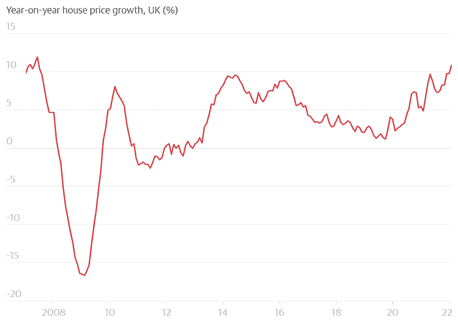Despite the disruption caused by the coronavirus pandemic, the UK housing market has seen strong growth in recent months. According to data from the Office for National Statistics (ONS), house prices rose by 10.9% in the year to February 2022.
However, this strong level of growth may not last forever. As interest rates creep higher and many households find their incomes squeezed due to the cost of living crisis, people may struggle to afford larger and larger mortgages.
Due to these reasons, there have been murmurings that a market correction might be around the corner, so read on to find out what this is and how it could affect you.
House prices saw strong growth in 2021 due to high demand and low interest rates
In the past few months, the UK housing market has enjoyed a period of strong growth. Despite concerns about the economic impact of the coronavirus, property prices have defied expectations.
According to the Guardian, the average value of a house reached £278,123 in March 2022, with recent activity representing the highest growth in prices for more than a decade.

Source: the Guardian
While the economic fallout of the pandemic raised fears of a downturn for the property market in 2021, these worries were ultimately unfounded.
One of the main reasons for this was that interest rates sat at a historic low of only 0.1% until December, when the Bank of England (BoE) raised them to 0.25%. This made it extremely cheap to borrow money, encouraging buyers to take out larger mortgages and enabling prices to rise.
On top of this, people’s confidence was buoyed by the government’s support for the housing market in the form of the Stamp Duty holiday. This lasted until September and allowed buyers to save a large amount of money in tax when buying a property.
However, the factors that led to this strong growth could be about to end soon, with some experts warning of a “market correction” that could see house prices tumbling.
Rising living costs and higher interest rates could cause prices to fall
One of the biggest economic changes in recent months is that inflation has been rising sharply. According to data from the ONS, the Consumer Price index (CPI) rose to 7% in the year to March 2022.
From loaves of bread to litres of petrol, the prices of many goods have been rising due to global economic factors, such as the fallout of the pandemic and the ongoing war in Ukraine.
Due to this increase in the cost of living, many people now have less spending power. This acts as a disincentive to move, as buyers are less able to make higher monthly mortgage repayments.
On top of this, interest rates have been slowly creeping up in recent months. As we mentioned in a previous article, in March the BoE raised their base rate to 0.75% and hinted that further increases may be in store if inflation continues to rise.
This is something of a double whammy, as prospective buyers have less spending power and mortgages are more expensive due to higher interest rates. This combination of factors could mean that many buyers are now unable to afford the current level of house prices.
If this is the case, the value of homes could fall sharply as the market corrects itself. According to the Telegraph, properties in London could be overvalued by as much as 50%, meaning their owners could be in serious financial danger if a crash does occur.
A market correction could be a valuable opportunity if you’re a buy-to-let landlord
As you might imagine, if you’re a homeowner then a market correction could pose a significant problem for you.
If house prices were to fall, you could be at risk of being in negative equity, as the value of your assets is now lower than the debt you hold. This could make it difficult for you to move home when the time comes to take another step up the property ladder.
That being said, a market correction could also be a valuable opportunity if you’re a first-time buyer or buy-to-let landlord. If house prices fall, it could be much cheaper for you to buy a property, whether to live in or to add to your portfolio.
Of course, it’s important to bear in mind that there’s no guarantee this will happen, as many expected the market to crash in 2020, when the pandemic first started. Instead, according to the ONS, house prices grew by 7.5% in the year to January 2021!
Whatever the future may hold, working with a financial planner can help you to ensure you’re on track to reach your long-term goals and ride out any temporary market dips.
Get in touch
If you want to know more about how the cost of living crisis could affect your wealth, we can help. Please email enquiries@metiswealth.co.uk or call 0345 450 5670.
Please note
Your home may be repossessed if you do not keep up repayments on a mortgage or other loans secured on it.
Buy-to-let (pure) and commercial mortgages are not regulated by the FCA.
Think carefully before securing other debts against your home.
